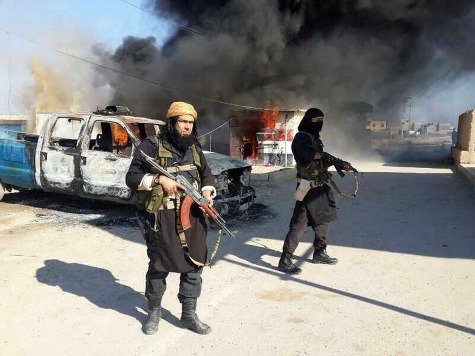After an official government statement accused Saudi Arabia of “genocide,” it only took hours for Prime Minister Nouri al-Maliki to release a unity statement video on Iraqi television. As America calls for the Iraqi government to do more to include Sunnis and Kurds, ISIS continues its threat to spread into Baghdad.
“We hold them responsible for supporting these groups financially and morally and for its outcome – which includes crimes that may qualify as genocide,” reads a statement by the Iraqi government condemning Saudi Arabia for its alleged ties to the Islamic State of Iraq and al-Sham (ISIS), the Sunni jihadist terrorist organization wreaking havoc throughout Iraq. Reuters notes that the Saudi government vehemently denied the statement, and former Prime Minister Ibrahim al-Jaafari read a statement of unity on television.
Jaafari appeared flanked by Sunni and Kurdish leaders after a private meeting and read a statement supporting a united, sovereign Iraq. “No terrorist powers represent any sect or religion,” he asserts, attempting to distance the greater Sunni population from forces like ISIS, which claim to represent the entire Sunni sect against the Shi’ite government.
The statement was a step in the direction the United States has hoped the Iraqi government would go–significantly more so than the “genocide” statement previously released. The Obama administration is deploying the presence of 275 troops, having already deployed about one hundred Marines to protect the United States embassy in Baghdad. This reaction has been tepid compared to that of Iran, which has placed 2,000 troops in Iraq and has offered the Iraqi government extensive help fighting ISIS. Additionally, Iran has urged the United States to do more to protect Iraq.
The Obama administration has been adamant in declaring that it will not return troops on the ground to the war in Iraq; those being sent over, they have alleged, are security forces there for the purpose of protecting American citizens. “The president was very clear that we will not be sending U.S. troops back into combat in Iraq,” states National Security Spokesperson Caitlin Hayden. Nonetheless, ABC News reports that a White House official, on the condition of anonymity, revealed that sending U.S. Special Operation Forces to Iraq “is a viable, potential course of action.” The forces would be there to advise the Iraqi military, however–not for combat themselves. But such an advisory position would put them very close to battle.
While the United States contemplates strategy, ISIS jihadists continue their march towards Baghdad. While there have been previous reports of something of a “detente” between Kurdish peshmerga forces and ISIS, that relative calm appears to have broken Tuesday. Bloomberg reports that ISIS deliberately attacked Kurdish forces in Kirkuk, injuring almost 50 people and killing two soldiers and a civilian. Kurdish forces had previously seized a large oil field in the area from the Iraqi military, which was routed earlier in the struggle. The Iraqi government, Bloomberg also notes, is beginning a process of punishing the soldiers who abandoned Kirkuk and other major cities to the hands of ISIS or Kurdish forces.

COMMENTS
Please let us know if you're having issues with commenting.